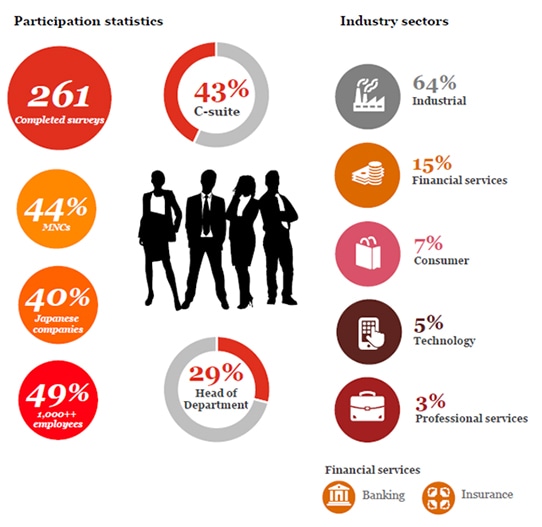
Global Economic Crime Survey 2016: Economic Crime in Thailand
In Thailand, four in ten listed companies experienced fraud.
Thailand’s part in PwC’s 2016 Global Economic Crime Survey (GECS) garnered the most responses from senior decision makers, with 261 participants completing the survey compared to 76 from the past report. Respondents were from a wide range of sectors representing a mix of listed, private and public sectors. The C-suite made up 43% of the respondents, and another 9% were senior vice presidents, vice presidents, and directors.
Of the total respondents, 44% were multinational corporations, 40% represented Japanese companies, and 49% were companies with more than 1,000 employees. The largest number of respondents were from the manufacturing sector, followed by automotive and financial services.

The latest survey found that although Thailand's overall fraud rates are in line with South East Asia's average of 26%, many organisations admitted that the numbers could be higher as they were uncertain if their existing systems were able to detect fraud.
In Thailand, 39% of listed companies experienced fraud as did another 16% of private companies, which is below the global average of 30%. A number of initiatives have been developed in the past few years to help Thai companies prevent fraud, including capacity-building initiatives by the Economic Crimes Suppression Division of the Royal Thai Police, and non-binding recommendations from private sector bodies such as the Collective Action Coalition (CAC) by the Thai Institute of Directors (IOD).
Globally, more economic crime was reported at publicly traded companies (41%) than private entities (30%). Four-in-ten (41%) mid-size or larger companies reported fraud, compared to three out of ten small companies with fewer than 1,000 employees. Half the financial services respondents (48%) said that fraud was found in their organisation, while just 33% in other sectors said that they had suffered from fraud.
Almost 80% of incidents of serious economic crime were perpetrated internally, which is considered high risk because employee fraud is more difficult to detect.
In line with global and regional trends, most respondents (64%) said that internal fraudsters are motivated primarily by opportunity, or the ability to commit fraud. This finding reinforces the need to have strong internal controls and anti-fraud measures as deterrents. Employee morale also plays a role in fraud risk because disgruntled staff are more likely to cheat their employers.

Related content

Contact us





© 2017 - 2026 PwC. All rights reserved. PwC refers to the PwC network and/or one or more of its member firms, each of which is a separate legal entity. Please see www.pwc.com/structure for further details.



